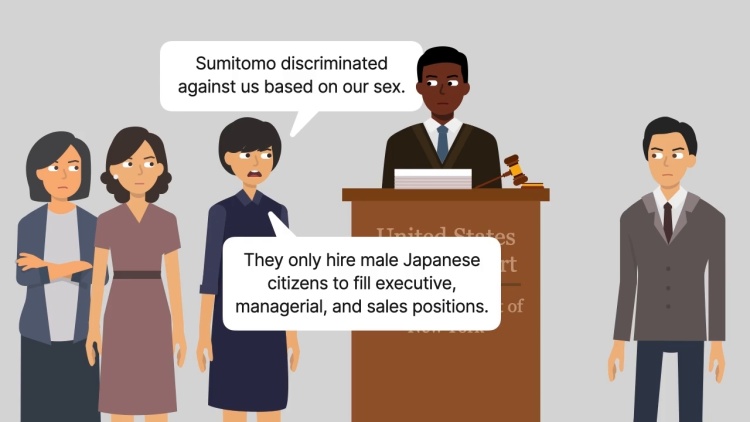Sumitomo Shoji America, Inc. v. Avagliano
United States Supreme Court
457 U.S. 176, 102 S. Ct. 2374, 72 L. Ed. 2d 765 (1982)
- Written by Robert Cane, JD
Facts
The United States and Japan entered the 1953 Treaty of Friendship, Commerce and Navigation (treaty) to grant corporations of each country legal status in the territory of the other and to allow foreign corporations to conduct business on an equal basis with domestic firms. Under the Article VIII(1) of the treaty, companies of both countries were entitled to employ any professional specialists of their choice if operating in the territory of the other country. In other words, a Japanese company operating in United States territory was entitled to broad discretion in filling professional positions and was not subject to United States employment laws. The treaty further provided in Article XXII(3) that a company constituted under the laws of one of the countries was to be deemed a company of that country. Sumitomo Shoji America, Incorporated (Sumitomo) (defendant) was a New York corporation that was a subsidiary of a Japanese parent corporation. A group of female secretarial employees (employees) (plaintiffs) of Sumitomo sued their employer and alleged that Sumitomo had a practice of hiring only male Japanese citizens to fill its executive, managerial, and sales positions in violation of Title VII of the Civil Rights Act of 1964 (civil-rights act). The civil-rights act made it unlawful to discriminate based on sex and national origin, among other classifications, in making employment decisions. The district court held that Article VIII(1) of the treaty did not apply to Sumitomo because it had been incorporated in the United States, so the civil-rights act applied to its employment practices. Notably, both Japan and the United States supported this interpretation of the treaty. On an interlocutory appeal, the court of appeals held that the United States and Japan intended Article VIII(1) to cover locally incorporated subsidiaries of foreign companies like Sumitomo. The employees appealed.
Rule of Law
Issue
Holding and Reasoning (Burger, C.J.)
What to do next…
Here's why 911,000 law students have relied on our case briefs:
- Written by law professors and practitioners, not other law students. 47,100 briefs, keyed to 997 casebooks. Top-notch customer support.
- The right amount of information, includes the facts, issues, rule of law, holding and reasoning, and any concurrences and dissents.
- Access in your classes, works on your mobile and tablet. Massive library of related video lessons and high quality multiple-choice questions.
- Easy to use, uniform format for every case brief. Written in plain English, not in legalese. Our briefs summarize and simplify; they don’t just repeat the court’s language.





